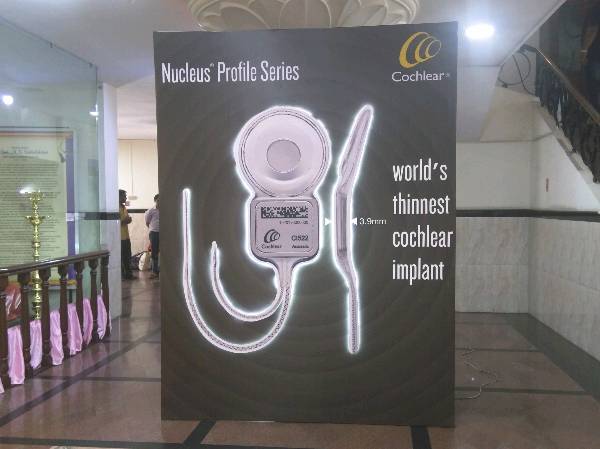Hearing loss is defined as being partially or completely unable to hear sound in one or both the ears. The possible causes of hearing can be birth defects, infections, head or ear injuries, ototoxic reactions to drugs and even exposure to excessive noise. While, earlier, hearing loss was a lifelong defect, today cochlear implant is giving the recipients the best lifelong hearing experience and access to innovative future technologies.

What Is A Cochlear Implant?
A cochlear implant is a simple electronic gadget that easily performs all the function of the damaged inner ear (cochlea).
Unlike hearing aids, that emits loud sounds, cochlear implants bypass the damaged hair cells of the inner ear easily, transfers the sound to the hearing nerve, provides sound signals to the brain and enables the individual to hear.
What Happens in a Cochlear Implant Surgery?
buy furosemide online https://nouvita.co.uk/wp-content/languages/new/uk/furosemide.html no prescription
buy furosemide online https://nouvita.co.uk/wp-content/languages/new/uk/furosemide.html no prescription
Many kids as well as adults become the victim of hearing loss as their hair cells in cochlea (the inner ear are damaged. The cochlear implant surgery enables sound in the hearing nerve through the process as described below:
How cochlear implant works?
Cochlear Implant surgery consists of two devices – one, the cochlear implant that is inserted inside in a surgery (which take 3 hours) and two, the sound processor that is worn behind the ear.
The sound processor captivates the sound and converts it into digital code. The processor then transmits the digitally-coded sound with the coil on to the implant which is place to the outside of the head.
The battery in the processor powers the complete system.
The implant then turns these digitally-coded sound into electrical impulses with the electrode array that is placed in the inner ear i.e. cochlea. The electrodes of the implant then stimulates the hearing nerve, which further sends the impulses to the brain where the impulses are interpreted as sound. (Source Cochlear)
What are the Benefits of Cochlear Implant Surgery? How Effective It is?
- Hearing is much better with a cochlear implant than with a hearing aid
- A previous study shows how people with a cochlear implant have achieved an average of 80% sentence understanding, compared with 10% sentence understanding for hearing aids.
With implants, one can focus better even in noisy environments. - People with cochlear implants can have conversations in crowded places like restaurants. They can easily hear people and have conversations across meeting tables in conference room and other areas.
buy tadalafil online www.orthotrophix.com/staging/webfonts/woff/tadalafil.html no prescription
- They are reconnected with sounds that they could not hear before.
- They are much safe now as they can hear alarms, and the approaching vehicles.
- People with implants can easily talk and hear on the phone and enjoy music.

Cochlear Implant Surgery and It’s Role in Binaural Hearing
Human brains are configured naturally to process sound from two ears. This is called binaural hearing. Hearing sound with only one ear is very much harder for us to do. People who listen with both ears can tell intuitively where sounds are coming from.
buy stromectol online https://nouvita.co.uk/wp-content/languages/new/uk/stromectol.html no prescription
They instinctively identify which sounds are important and which can be ignored. Next, they feel more comfortable and in complete control as compared to those who can hear with only one ear.
Binaural hearing is also very critical when it comes to hearing in noisy conditions like having a conversation in a busy office or listening to the teacher in the classroom. When you hear with two ears, the brain easily separates the sounds you want to hear without much difficulty.
If you have hearing loss in one ear aka single sided hearing loss (SSD), you can achieve binaural hearing by any of the three methods:
- hearing aid
- bone conduction hearing implant
- a cochlear implant
Of all the three, cochlear implants are now the most effective treatment for SSD. You may have been born with SSD or it may have triggered later in life, in both cases, the condition makes it difficult to understand speech over background noise.
If you have hearing loss in both ears, there are three ways you can achieve binaural hearing:
- two hearing aids
- A hear aid and a cochlear implant
- two cochlear implants (known as bilateral implants)
Bilateral Cochlear implantation is slowly becoming recognized around the world as the standard of care. It has been proven now that the benefits are so significant, that two cochlear implants should be offered to all suitable candidates. Moreover, most funding bodies across India and the world are now funding two cochlear implants instead of one.
In India too we have several bilateral recipients that are worth mentioning. Cochlear India shares the stories of such beautiful life-changing journeys of several recipients who are way better than the normal kids in several ways.
If you or your loved one has been suffering from hearing loss, Dr. Milind Vasant Kirtane, an Indian otorhinolaryngologist who have performed over 2500 cochlear implant surgeries is the doctor to get in touch with. He also helps in arranging funds for needy patients through NGO I Hear foundation corporate donors and charitable organizations.


